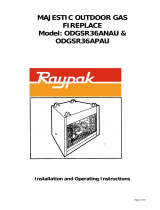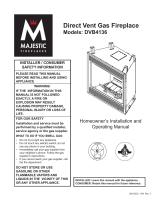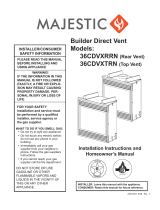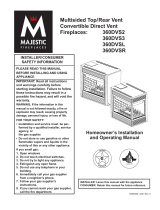
3
UVS33/36 Vent-Free Heaters
20002211
Installation & Operating Instructions
annually. More frequent cleaning may be required due to
excess lint and dust from carpeting, bedding material, etc.
6. Control compartments, burners and air passages in this
heater should be kept clean and free of dust and lint. Make
sure the gas valve and pilot light are turned off before you
attempt to clean this unit.
7. Under no circumstances should any solid fuels (wood, coal,
paper or cardboard, etc.) be used in this heater.
8. Keep the area around your heater clear of combustible ma
-
terials, gasoline and other flammable vapor and liquids. This
heater should not be used as a drying rack for clothing, nor
should Christmas stockings or decorations be hung in the
area of it.
9. Whether the heater is installed directly on carpeting, vinyl
tile or any combustible material other than wood, this heater
must be installed on a metal or wood panel extending the
full width and depth of the heater.
10. Do not install heater in bathroom.
11. Heater may be installed in bedroom when orificed at 10,000
BTU or as per local codes.
12. Do not use this heater if any part has been under water. Im
-
mediately call a qualified service technician to inspect room
heater and to replace any part of control system and any
gas control which has been under water.
This gas room heater should be installed by a qualified installer
in accordance with local building codes and with current Na-
tional Fuel Gas Code ANSI Z223.1/NFPA 54.
This heater shall not be installed in a confined space or un
-
usually tight construction unless provisions are provided for
adequate combustion and ventilation air.
This appliance is for supplemental heating only. It should not be
used as the primary heat source for a dwelling.
The National Fuel Gas Code, ANSI Z233.1/NFPA 54 defines a
confined space as a space whose volume is less than 50 cubic
feet per 1,000 Btu per hour (4.8m
3
per kw) of the aggregate
input rating of all appliances installed in that space and an
unconfined space as a space whose volume is not less than
50 cubic feet per 1,000 Btu per hour (4.8 m
3
per kw) of the
aggregate input rating of all appliances installed in that space
and an unconfined space as a space whose volume is not less
than 50 cubic feet per 1,000 Btu per hour (4.8m
3
per kw) of the
aggregate input rating of all appliances installed in that space.
Rooms communicating directly with the space in which the
appliances are installed, through openings not furnished with
doors, are considered a part of the unconfined space.
WARNING:
If the area in which the heater may be operated is
smaller than that defined as an unconfined space or if the build-
ing is of unusually tight construction, provide adequate combus-
tion and ventilation air by one of the methods, described in the
National Fuel Gas Code, ANSI Z 223.1/NFPA 54, Section 5.3 or
applicable local codes."
Unusually tight construction is defined as construction where:
a) Walls and ceilings exposed to the outside atmosphere have a
continuous water vapor retarder with a rating of 1 perm (6 x 10-
11 kg per pa-sec-m
2
) or less with openings gasketed or sealed,
and
b) Weather stripping has been added on openable windows
and doors, and
c) Caulking or sealants are applied to areas such as joints
around window and door frames, between sole plates and
floors, between wall-ceiling joints, between wall panels, at
penetrations for plumbing, electrical, and gas lines, and at other
openings.
Fireplace screen (when equipped) must be closed while the
appliance is in operation.
This appliance may be installed in an aftermar-
ket, permanently located, manufactured (mobile)
home, where not prohibited by local codes.
This appliance is only for use with the type of gas
indicated on the rating plate. This appliance is not
convertible for use with other gases.
IMPORTANT:
Please Review the Following Carefully
It is normal for fireplaces fabricated of steel to give off some
expansion and/or contraction noises during the start up or cool
down cycle. Similar noises are found with your furnace heat
exchanger or car engine.
It is not unusual for your gas fireplace to give off some odor the
first time it is burned. This is due to the curing of the paint and
any undetected oil from the manufacturing process.
Please ensure that your room is well ventilated - open all
windows.
It is recommended that you burn your fireplace for a least six
(6) hours the first time you use it. If optional fan kit has been
installed, place fan in the "OFF" position during this time.
Proposition 65 Warning: Fuels used in gas, wood-
burning or oil fired appliances, and the products of
combustion of such fuels, contain chemicals known to
the State of California to cause cancer, birth defects
and other reproductive harm.
California Health & Safety Code Sec. 25249.6
WARNING: Do not install televisions or other elec-
tronic devices above this fireplace unless approved
by the electronics manufacturer.
FOR SAFE INSTALLATION AND OPERATION OF YOUR VENT-
FREE ROOM HEATER PLEASE NOTE THE FOLLOWING:
1. This heater gives off high temperatures and should be
located out of high traffic areas and away from furniture and
draperies.
2. Children and adults should be alerted to the hazards of the
high temperature surface of this heater and should stay
away to avoid burns or ignition of clothing.
3. Children should be carefully supervised when they are in the
same room as the heater.
4. Under no circumstances should this heater be modified.
Parts removed for service should be replaced prior to oper-
ating this heater again.
5. Installation and any repairs to this heater should be carried
out by a qualified service person. A professional service
person should be contacted to inspect this heater annually.
Make it a practice to have all of your gas heaters checked


























